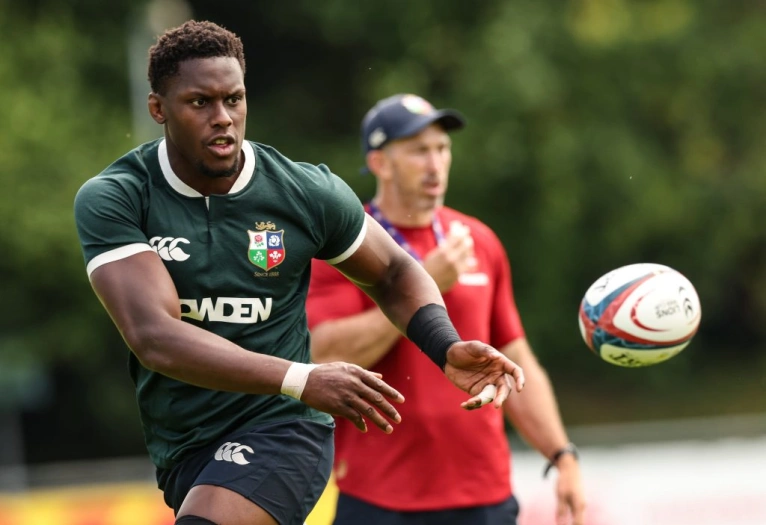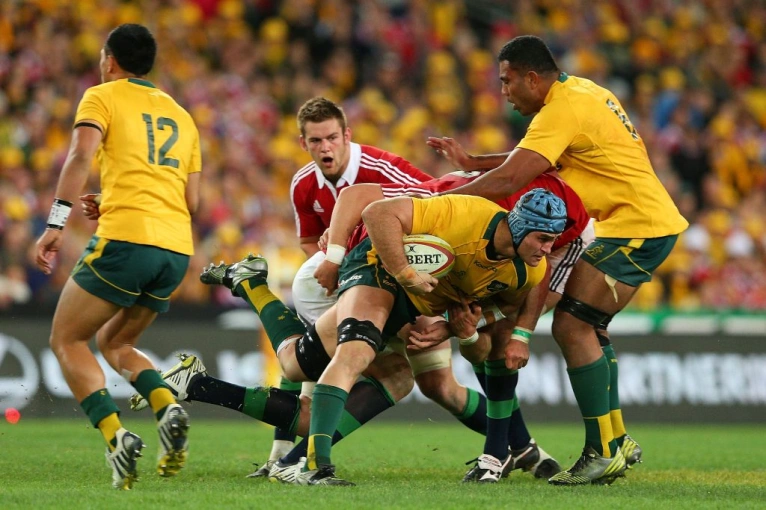Closely mirroring the southern hemisphere disciplinary process, a new off-field sanction process has been approved as a closed trial across World Rugby competitions, the British and Irish Lions tour, and the upcoming international window starting on 21st June with the England XV v France XV game.
Brian Hammond, legal counsel at World Rugby, explains the background to the changes and what we can expect to see in the coming weeks of Test action.
So, a new Foul Play Review Committee (FPRC) is being introduced, what was the thinking behind that?
The main focus is to streamline the disciplinary process and speed it up in what we hope will be the majority of the cases, while also cutting out the white noise that fills the vacuum in what can be a four-day period between a very public red card and a disciplinary decision being published. That’s the feedback we’ve had from the game.

To give you a bit of legal context, the disciplinary process mirrored the English legal system, so it ran like a mini trial, just less adversarial. The player gives evidence and we can respond to it. The feeling was there’s more formality than the modern game needs. This new approach makes dealing with issues more rugby focused, in essence without getting tied up in time-consuming legalese.
Is this related to the 20-minute red card that’s been rolled out in the past year?
There is crossover because the 20-minute red card and off-field sanctioning changes were being considered by World Rugby Council together initially, but while the 20-minute red card went to closed trial a little earlier, the off-field sanctioning needed a bit more time. A year on, we’re now ready to roll out the changes ahead the Lions tour to Australia, the U20 World Championships, the July International Window, the Pacific Nations Cup, and the Women’s World Cup, over a trial period the results of which will be reviewed before 2026. In that time there will be plenty of feedback on what works, what doesn’t and we can tweak certain areas before it goes to global trial.
Was it a race against time to get it rolled out before the Lions tour?
Not really, no, the Lions came to us to ask us to manage the disciplinary programme which we have been doing for multiple Lions series. This includes disciplinary arrangements, appointing match officials and appointing citing commissioners.

For clarity, on this Lions tour we have appointed seven members of the World Rugby Judicial Panel to sit on the Foul Play Review Committee – two judicial officers and five panel members. The majority have been involved in foul-play review committees with Super Rugby Pacific and are all hugely experienced.
Remind us, how did the ‘old’ system work?
If we take the Lions, there have been a few contentious incidents over the years. James Horwill was cited in 2013. We saw a red card for Sonny Bill Williams for a high shot on Anthony Watson in the second Test in 2017 and there was controversy about whether Cheslin Kolbe ought to have been cited for making contact with Conor Murray in the air on the most recent tour four years ago, but let’s talk hypothetically for now.

Say a Lions player got a red card in the first Test, he would be required to appear at a full disciplinary hearing before a three-person panel (one is a judicial officer who is legally qualified, and the other two are highly experienced rugby people, for example ex-players or ex-coaches). This could ordinarily take two days to schedule depending on the player’s availability. The player or his legal representative would have the right to send in a written submission as to why he doesn’t think it’s a red card and why he doesn’t think it’s foul play. We go into a hearing which can take a couple of hours, we look at clips and all evidence from the match official reports, including any submissions the player or his legal representative wishes to make. Then the panel retires to consider everything they’ve heard and seen and come back in and to deliver their decision.
What is going to change with the new FPRC process?
What this now looks like is shortly after the final whistle a foul play review committee comprised of one legally qualified Judicial Officer and two other highly experienced rugby people will convene if there’s been a red card or citing. The player can provide their submission on what they say happened and we as World Rugby don’t reply to it. If you take that Lions player example, if he gets a red card for a high tackle, and it’s what we’d call a technique error, something like a fatigued tackle, and the FPRC proposes a three-match sanction, he may decide to accept that proposed sanction and there is no further need for a hearing.
Are we looking at technique failures more than serious offences?
Not exactly, they will look at all foul play but for the more serious incidents, they may decide to refer it for a full hearing to get the full facts. The foul play committee in this example would meet on the following day, the player could send in a statement to say, “there was a change in body height, I didn’t mean to do it”, or whatever he says the mitigation should be.

The committee would look at the statements, the match clips, and no-one else would be present in the room. They’d say, “it looks like a three-match suspension, but we can offer him three, with one off for the coaching intervention”. That comes back to the World Rugby Disciplinary Officer, which is basically me, and I would then speak to the team manager, to say, “the foul play committee has proposed a sanction of three down to two, does the player accept it?” If the player says, “fine, I accept that”, perfect. He can go off to do a coaching intervention course and it’s case closed. The sanction starts immediately. It doesn’t have to go to a hearing and all the complications that entails in a game week.
However, if he appeals it and says, “no, I don’t agree with that, I don’t think that’s right”, it will then go to the more traditional disciplinary hearing. That option is still available to a player.
Okay, makes sense, what is the nub of rolling out this new FPRC?
The whole purpose is to expedite the process. It emerged from the Shape of the Game conference in 2024. It was agreed then the process needed to be more efficient and the recent Council decision is where we ended up. The idea you could have a disciplinary hearing three or four days after a match is just not conducive to modern sport. When you factor in an appeal, there’s a chance players could be finding out the final decision the night before the next match. That’s simply not good for anybody.
If the player and team manager decide that the outcome before a disciplinary committee is likely to be the same as the FPRC decision, they are more likely to say, “let’s just accept it and move on”, helping the coach with clarity on selection policy and training arrangements ahead of the next game. The names of the FPRC members will be on the public decision for full transparency.
What other benefits does the FPRC have?
Most importantly, it fills that vacuum created by media and fans, because once you put out a press release to say there’s a hearing on Tuesday, you have three days of claim and counter claim, all played out in the media, mass confusion and social media dis- or mis-information, with screengrabs, different angles and the like. It can be trial by social media and doesn’t help a fair process for the player.

Over the next 12 months, we hope to get credible data which shows that a high percentage of disciplinary issues can be sorted out in 24-36 hours, rather than rumbling on into midweek.
Are there any precedents?
We had seven cards and citings across last year’s U20 World Championship and Trophy, PNC and the WXV, and even though it was a slightly different system – we had two and four-match sanction options – all of them were accepted and no one appealed, which indicated to me at least, that there was a willingness to get it done and dusted swiftly.
How about any areas where the FPRC cannot act?
The committee can recommend a sanction, they can issue a warning, or they can refer a matter to a full hearing. However, if it’s something more serious, for example serious foul play or match official abuse, then it’s highly likely the FPRC would refer it to a disciplinary committee for a full hearing.
Are there any other changes we need to know about?
Well, the FPRC cannot overturn red cards. If they want to overturn a card or citing, it has to be referred to the disciplinary committee, who will consider it. Other details of note include the citing window being reduced to 12 hours with teams having four hours for referrals to the citing commissioner which will facilitate earlier meetings of the FPRC.
While the timings of FPRC meetings for each competition and fixture will vary, for the Lions tour the FPRC will meet within 17 hours of the final whistle and any hearings will be completed within 48 hours, reflecting the midweek games and single nation nature of the tour. I have full confidence the FPRC will run smoothly, so fingers crossed it helps the modern game.


Comments
Join free and tell us what you really think!
Sign up for free